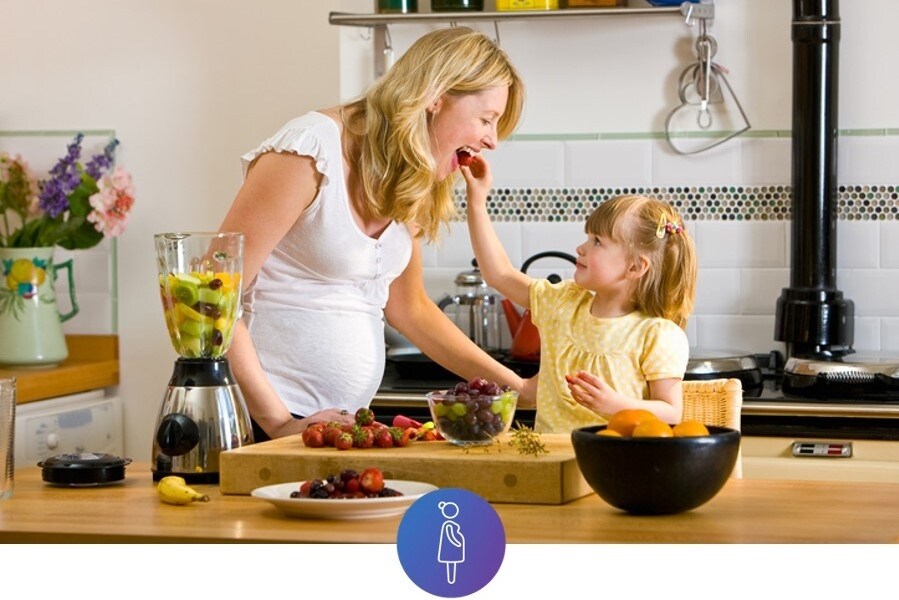
Video: Nutrition for a Healthy Pregnancy Part 2 with Dr. Gregory Ward
Dr. Gregory Ward explores nutrition research that points to the benefits of docosahexaenoic acid (DHA) omega-3.
By: Lucy Jones, MRES BSC Hons RD MBDA
October 7, 2016
As I shared in Part I of this two-part article, there are several nutrients that are needed to support a healthy pregnancy. In this article, I discuss three others – vitamin D, iron and folic acid.
Vitamin D supports a child’s bone development by helping the body absorb calcium and phosphorus. But it also goes beyond this – vitamin D has an increasingly recognized repertoire of other actions, such as promoting insulin action and secretion, immune modulation and lung development. It therefore has the potential to influence many factors in the developing fetus. In fact, low vitamin D levels in pregnancy are linked to preeclampsia, low birth weight, glucose intolerance, fetal bone development, and even potentially childhood asthma. Low vitamin D intakes are a key reason behind the re-emergence of rickets in children.[1]
Vitamin D deficiency is very common in some parts of the world, like northern Europe, especially in women with darker pigmented skin and people who are overweight and obese. Vitamin D deficiency is three times more common in the winter and spring compared to the summer and autumn, due to reduced sun exposure.[1]
Everyone in pregnancy should take a supplement of 10 mcg vitamin D, to ensure their levels are adequate with people who are ‘at risk’ or have a deficiency needing much higher doses.[1]
In addition to supporting normal blood formation and the normal function of the immune system,[2] iron is a key nutrient for brain development.[3]
Iron deficiency is the most common cause of anemia during pregnancy worldwide16. Because of this, the World Health Organization recommends the use of antenatal iron supplements in low and middle-income countries, and it is also recommended in some high-income countries.[4] Women need extra iron in pregnancy so adequate dietary sources are really important, such as red meat, dried fruit, nuts, seeds and green leafy vegetables.
A recent systematic review and meta-analysis study looked at the findings from 48 randomized controlled trials, including nearly 18,000 women, which reviewed the effects of iron supplementation upon maternal anaemia during pregnancy and birth outcomes16.
The pooled results of the trials provide good evidence that iron supplements halve the risk of the mother becoming anaemic during late pregnancy or around the time of birth. Supplements also resulted in the baby being on average 41.2 g heavier at birth and decreased the risk of the baby being of low birth weight by 19 percent.[4] This anaemia in early life affects the child’s development including their memory, reflexes and can even result in poorer school performance later on.[3]
Folic acid (also known as vitamin B9) is very important for the development of a healthy fetus, as it can significantly reduce the risk of neural tube defects (NTDs), such as spina bifida[5].
The European Food Safety Authority (EFSA) confirmed the role of folic acid before and during pregnancy. It is recommended that women take a daily supplement of 400 micrograms of folic acid while they are trying to conceive, and should continue taking this dose for the first 12 weeks of pregnancy, when the baby’s spine is developing.[5] Dietary sources of folic acid include green, leafy vegetables, brown rice, granary bread, and breakfast cereals fortified with folic acid. However, it would be almost impossible to get enough folic acid just from food – the only way to be sure you are getting the right amount is by taking a supplement.
It is well known that uptake of supplements, even folic acid supplements, is poor in pregnancy, particularly among those from lower income families.[6] A recent survey illustrated that less than a third (30.3 percent) of new moms were aware of the role that vitamin D has in pregnancy and breastfeeding for example, nor that supplements are recommended for this nutrient, let alone the lesser known nutrients.[7] More and more countries include folic acid supplementation for pregnant women in their national recommendations.
We have a long way to go in getting all pregnant women to achieve the right nutrition to maximize the potential that the first 1000 days of development can bring. The best way to do this is by encouraging a colorful, varied, balanced diet and a selection of supplements to support higher nutrient intakes where needed. These nutrients are the keys to unlocking a healthy pregnancy and your baby’s future health.
1. Royal College of Obstetricians and Gynaecologists (2014) Scientific Impact Paper 43 – Vitamin D in pregnancy. Accessed from https://www.rcog.org.uk/globalassets/documents/guidelines/scientific-impact-papers/vitamin_d_sip43_june14.pdf Last Accessed 8th September 2016
2. EFSA (2009) Scientific Opinion on the substantiation of health claims related to iron and formation of red blood cells and haemoglobin (ID 249, ID 1589), oxygen transport (ID 250, ID 254, ID 256), energy-yielding metabolism (ID 251, ID 1589), function of the immune system (ID 252, ID 259), cognitive function (ID 253) and cell division (ID 368) pursuant to Article 13(1) of Regulation (EC) No 1924/2006. EFSA Journal. 7(9):1215 [20 pp.]
3. Georgieff MK (2008). The Role of Iron in Neurodevelopment: Fetal Iron Deficiency and the Developing Hippocampus. Biochem Soc Trans. Vol 36(Pt 6): 1267–1271
4. Haider BA, et al. Anaemia, prenatal iron use, and risk of adverse pregnancy outcomes: systematic review and meta-analysis. BMJ. Published online June 21 2013
5. EFSA Panel on Dietetic Products, Nutrition and Allergies (NDA) (2013) Scientific Opinion on the substantiation of a health claim related to increasing maternal folate status by supplemental folate intake and reduced risk of neural tube defects pursuant to Article 14 of Regulation (EC) No 1924/2006. Accessed from http://onlinelibrary.wiley.com/doi/10.2903/j.efsa.2013.3328/epdf Last Accessed 8th September 2016
6. DTB (2016) Vitamin Supplementation in Pregnancy. Drug and Therapeutics Bulletin vol 54, no 7: pg. 81-84.
7. ‘Nutrimum knows best Survey’ of pregnant and breastfeeding women. July 2015.

Dr. Gregory Ward explores nutrition research that points to the benefits of docosahexaenoic acid (DHA) omega-3.

Colic in infants, though considered a benign condition, can bring a lot of stress to a family.

According to a global survey, 64 percent of parents worry about their child’s eye health given their increased exposure to blue light.

Brightest editors had the opportunity to sit down with Dr. Lauren R. Crosby, to learn more about DHA omega-3 and ARA omega-6 and why these fats are so important to a growing baby.